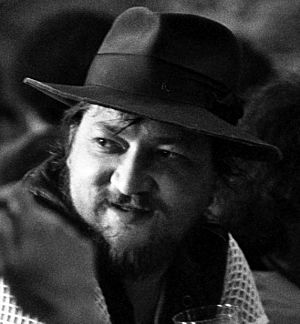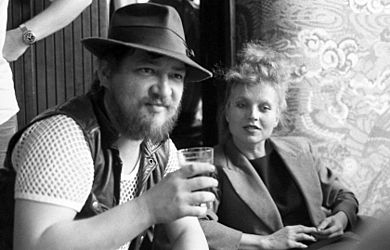Rainer Werner Fassbinder facts for kids
Quick facts for kids
Rainer Werner Fassbinder
|
|
|---|---|

Fassbinder in 1980
|
|
| Born | 31 May 1945 Bad Wörishofen, Bavaria, Allied-occupied Germany
|
| Died | 10 June 1982 (aged 37) |
| Resting place | Bogenhausener Friedhof, Munich |
| Occupation |
|
| Years active | 1965–1982 |
| Movement | New German Cinema |
| Spouse(s) |
Ingrid Caven
(m. 1970; div. 1972) |
Rainer Werner Fassbinder (German: [ˈʁaɪnɐ ˈvɛʁnɐ ˈfasbɪndɐ]; 31 May 1945 – 10 June 1982), sometimes credited as R. W. Fassbinder, was a German filmmaker. He is widely regarded as one of the major figures and catalysts of the New German Cinema movement. Fassbinder's main theme was the exploitability of feelings. His films were deeply rooted in post-war German culture: the aftermath of Nazism, the German economic miracle, and the terror of the Red Army Faction. Other prominent themes in his films include love, friendship, identity and more generally, the throes of interpersonal relationships.
His first feature-length film was a gangster movie called Love Is Colder Than Death (1969); he scored his first domestic commercial success with The Merchant of Four Seasons (1972) and his first international success with Ali: Fear Eats the Soul (1974), both of which are considered masterpieces by contemporary critics. Big-budget projects such as Despair (1978), Lili Marleen and Lola (both 1981) followed. His greatest success came with The Marriage of Maria Braun (1979), chronicling the rise and fall of a German woman in the wake of World War II.
Fassbinder died on 10 June 1982, at age 37. His career lasted less than two decades, but he was extremely prolific; he completed over 40 feature films, two television series, three short films, four video productions, and 24 plays, winning 5 of the most prestigious prizes for feature film in Germany, including the Golden Bear and multiple German Film Awards. His premature death is often considered the end of the New German Cinema timeframe.
Early life
Fassbinder was born in the small town of Bad Wörishofen on 31 May 1945. He was born three weeks after US Army occupied the town and the unconditional surrender of Germany. The aftermath of World War II deeply marked his childhood and the lives of his family. In compliance with his mother's wishes, Fassbinder later claimed he was born on 31 May 1946, to more clearly establish himself as a child of the post-war period; his real age was revealed shortly before his death. He was the only child of Liselotte Pempeit (1922–93), a translator, and Helmut Fassbinder, a doctor who worked from the couple's apartment in Sendlinger Straße, Munich. When he was three months old, he was left with a paternal uncle and aunt in the country, since his parents feared he would not survive the winter with them. He was one year old when he was returned to his parents in Munich. Fassbinder's mother came from the Free City of Danzig (now Gdańsk, Poland), whence many Germans had fled following World War II. As a result, a number of her relatives came to live with them in Munich.
Fassbinder's parents were cultured members of the bourgeoisie. His father concentrated on his career, which he saw as a means to inspire his passion for writing poetry. His mother largely ignored him as well, spending the majority of her time with her husband working on his career. In 1951, Liselotte Pempeit and Helmut Fassbinder divorced. Helmut moved to Cologne while Liselotte raised her son as a single parent in Munich. In order to support herself and her child, Pempeit took in boarders and found employment as a German to English translator. When she was working, she often sent her son to the cinema to pass time. Later in life, Fassbinder claimed that he saw at least one film a day, sometimes as many as four per day. During this period, Pempeit was often away from her son for long periods while she recuperated from tuberculosis. In his mother's absence, Fassbinder was looked after by his mother's tenants and friends. As he was often left alone, he became used to the independence and thus, became a juvenile delinquent. He clashed with his mother's younger lover Siegfried, who lived with them when Fassbinder was around eight or nine years old. He had a similar difficult relationship with the much older journalist Wolff Eder (c.1905–71), who became his stepfather in 1959. Early in his adolescence, Fassbinder came out as bisexual.
As a teen, Fassbinder was sent to boarding school. His time there was marred by his repeated escape attempts, and he eventually left school before any final examinations. At the age of 15, he moved to Cologne with his father. Though they argued constantly, Fassbinder stayed with his father for a couple of years while attending night school. To earn money, he worked small jobs; he also helped his father, who rented apartments to migrant workers. During this time, Fassbinder began to immerse himself in his father's world of culture, writing poems, short plays, and stories.
Beginnings
In 1963, aged 18, Fassbinder returned to Munich with plans to attend night school with the idea to eventually study drama. Following his mother's advice, he took acting lessons and from 1964 to 1966 attended the Fridl-Leonhard Studio for actors in Munich. There, he met Hanna Schygulla, who would become one of his most important actors. During this time, aged 20, he made his first 8mm short films, worked as a sound man in student films and as an assistant director or in small acting roles in theatre. During this period, he also wrote the tragic-comic play: Drops on Hot Stones. To gain entry to the Berlin Film School, Fassbinder submitted a film version of his play Parallels. He also entered several 8 mm films including This Night (now considered lost), but he was turned down for admission, as were Werner Schroeter and Rosa von Praunheim who would also have careers as film directors.
He returned to Munich where he continued with his writing. He also made two short films, The City Tramp (Der Stadtstreicher, 1966) and The Little Chaos (Das Kleine Chaos, 1967). Shot in black and white, they were financed by Fassbinder's lover, Christoph Roser, an aspiring actor from a wealthy family, in exchange for leading roles. Fassbinder acted in both of these films, which also featured Irm Hermann. In the latter, his mother – under the name of Lilo Pempeit – played the first of many parts in her son's films.
Theater career
Fassbinder joined the now defunct Munich Action-Theater in 1967; there, he was active as actor, director and scriptwriter. After two months he became the theatre's leader. In April 1968 he directed the production of his play Katzelmacher, which tells the story of a foreign worker from Greece who becomes the object of intense racial and political hatred. A few weeks later, in May 1968, the Action-Theater was disbanded after its theater was wrecked by one of its founders, jealous of Fassbinder's growing influence within the group. It promptly reformed as the Anti-Theater under Fassbinder's direction. The troupe lived and performed together. This close-knit group of young actors included among them Fassbinder, Peer Raben, Harry Baer and Kurt Raab, who along with Hanna Schygulla and Irm Hermann became the most important members of his cinematic stock company. Working with the Anti-Theater, Fassbinder continued writing, directing and acting. In the space of 18 months he directed 12 plays. Of these 12 plays, four were written by Fassbinder; he rewrote five others.
The style of his stage directing closely resembled that of his early films, a mixture of choreographed movement and static poses, taking its cues not from the traditions of stage theater, but from musicals, cabaret, films and the student protest movement.
After he made his earliest feature films at age 20 in 1969, Fassbinder centered the efforts of his career as film director, but maintained an intermittent foothold in the theater until his death. He worked in various productions throughout Germany and made a number of radio plays in the early 1970s. In 1974 at age 26, Fassbinder took directorial control over the Theater am Turm (TAT) of Frankfurt; when this project ended in failure, Fassbinder became less interested in theater.
In honor of Rosa von Praunheim, Fassbinder staged the play Dedicated to Rosa von Praunheim.
Early films and acclaim
Fassbinder used his theatrical work as a springboard for making films; and many of the Anti-Theater actors and crew worked with him throughout his entire career (for instance, he made 20 films each with actresses Hanna Schygulla and Irm Herrmann). He was strongly influenced by Brecht's Verfremdungseffekt (alienation effect) and the French New Wave cinema, particularly the works of Jean-Luc Godard. He also praised The Damned (1969) by Luchino Visconti his favorite movie. Other filmmakers who influenced Fassbinder included Howard Hawks, Michael Curtiz, Raoul Walsh, and Nicholas Ray.
Fassbinder developed his rapid working methods early. Because he knew his actors and technicians so well, Fassbinder was able to complete as many as four or five films per year on extremely low budgets. This allowed him to compete successfully for the government grants needed to continue making films.
Unlike the other major auteurs of the New German Cinema, Volker Schlöndorff, Werner Herzog and Wim Wenders, who started out making movies, Fassbinder's stage background was evident throughout his work. Additionally, he learned how to handle all phases of production, from writing and acting to direction and theater management. This versatility surfaced in his films too where, in addition to some of the aforementioned responsibilities, Fassbinder served as composer, production designer, cinematographer, producer and editor. He also appeared in 30 projects of other directors.
By 1976, Fassbinder had gained international prominence, prizes at major film festivals, premieres and retrospectives in Paris, New York and Los Angeles, and a study of his work by Tony Rayns had been published. All these factors helped make him a familiar name among cinephiles and campus audiences throughout the world. He lived in Munich when not traveling, rented a house in Paris with ex-wife Ingrid Caven. His films were a fixture in art houses of the time after he became internationally known with Ali: Fear Eats the Soul. In 1977, he was a member of the jury at the 27th Berlin International Film Festival.
Film career
Starting at the age of 21, Fassbinder made forty-four films and television dramas in 15 years, along with directing 15 plays for the theatre. These films were largely written or adapted for the screen by Fassbinder. He was also art director on most of the early films, editor or co-editor on many of them (often credited as Franz Walsh, though the spelling varies), and he acted in 19 of his own films as well as for other directors. He wrote 14 plays, created new versions of six classical plays, and directed or co-directed 25 stage plays. He wrote and directed four radio plays and wrote song lyrics. In addition, he wrote 33 screenplays and collaborated with other screenwriters on 13 more. On top of this, he occasionally performed many other roles such as cinematographer and producer on a small number of them. Working with a regular ensemble of actors and technicians, he was able to complete films ahead of schedule and often under budget and thus compete successfully for government subsidies. He worked fast, typically omitting rehearsals and going with the first take.
Fassbinder's first ten films (1969–1971) were said to be an extension of his work in the theater, shot usually with a static camera and with deliberately unnaturalistic dialogue.
In 1971 through 1977, his films brought him international attention, with films modeled, to ironic effect, on the melodramas Douglas Sirk made in Hollywood in the 1950s. In these films, Fassbinder explored how deep-rooted prejudices about race, sex, sexual orientation, politics and class are inherent in society, while also tackling his trademark subject of the everyday fascism of family life and friendship.
The final films, from around 1977 until his death, were more varied, with international actors sometimes used and the stock company disbanded, although the casts of some films were still filled with Fassbinder regulars. He became increasingly idiosyncratic in terms of plot, form and subject matter in movies like The Marriage of Maria Braun (1979), The Third Generation (1979) and Querelle (1982). He also articulated his themes in the bourgeois milieu with his trilogy about women in post-fascist Germany: The Marriage of Maria Braun (1979), The Angst of Veronica Voss and Lola.
"I would like to build a house with my films", Fassbinder once remarked. "Some are the cellars, others the walls, still others the windows. But I hope in the end it will be a house."
Fassbinder's work as a filmmaker was honored in the 2007 exhibition Fassbinder: Berlin Alexanderplatz, which was organized by Klaus Biesenbach at the Museum of Contemporary Art together with Kunst-Werke Institute for Contemporary Art, Berlin. For his exhibition at MoMA, Klaus Biesenbach received the International Association of Art Critics (AICA) award.
Personal life

Fassbinder rarely kept his professional and personal life separate, and was known to cast family and friends in his films. The three most important women of Fassbinder's life were Irm Hermann, Ingrid Caven and Juliane Lorenz, the editor of his films during the last years of his life.
Death
Fassbinder died on 10 June 1982. His remains were interred at Bogenhausener Friedhof in Munich.
Filmography
- Love Is Colder Than Death (1969)
- Katzelmacher (1969)
- Gods of the Plague (1970)
- Why Does Herr R. Run Amok? (1970)
- The American Soldier (1970)
- The Niklashausen Journey (1970)
- Baal (1970)
- Rio das Mortes (1970)
- Mathias Kneissl (1971)
- Whity (1971)
- The Merchant of Four Seasons (1972)
- The Bitter Tears of Petra von Kant (1972)
- Eight Hours Don't Make a Day (1972–1973)
- The Tenderness of Wolves (1973)
- World on a Wire (1973)
- Ali: Fear Eats the Soul (1974)
- Martha (1974)
- Effi Briest (1974)
- Fox and His Friends (1975)
- Mother Küsters' Trip to Heaven (1975)
- Shadow of Angels (1976)
- I Only Want You to Love Me (1976)
- Satan's Brew (1976)
- Chinese Roulette (1976)
- The Stationmaster's Wife (1977)
- Germany in Autumn (1978)
- Despair (1978)
- In a Year of 13 Moons (1978)
- The Marriage of Maria Braun (1979)
- The Third Generation (1979)
- Berlin Alexanderplatz (1980)
- Lili Marleen (1981)
- Lola (1981)
- Veronika Voss (1982)
- Kamikaze 1989 (1982)
- Querelle (1982)
Plays
- 1965: Nur eine Scheibe Brot (1995, Volkstheater Wien as part of the Bregenzer Festspielen)
- 1966: Tropfen auf heiße Steine (1985, Theaterfestival München; filmed in 2000 by François Ozon as Gouttes d'eau sur pierres brûlantes)
- 1968: Katzelmacher (Action-Theater in Munich, filmed by Fassbinder 1969; received Gerhart-Hauptmann-Preis)
- 1968: Der amerikanische Soldat (Antiteater in Munich, filmed by Fassbinder 1970)
- 1969: Preparadise sorry now (based on the case of Myra Hindley and Ian Brady, Antiteater in München)
- 1969: Anarchie in Bayern (Antiteater in Munich)
- 1969: Gewidmet Rosa von Praunheim (Antiteater in Munich)
- 1969: Das Kaffeehaus (based on Carlo Goldoni's La bottega del caffè, Schauspielhaus Bremen. Filmed by Fassbinder 1970)
- 1969: Werwolf (in collaboration with Harry Baer's Antitheather in Berlin)
- 1970: Das brennende Dorf (based on Fuente Ovejuna by Lope de Vega, Schauspielhaus Bremen)
- 1971: Blut am Hals der Katze (Antiteater in Nürnberg)
- 1971: Die bitteren Tränen der Petra von Kant (Deutsche Akademie der Darstellenden Künste or Experimenta in Frankfurt am Main. Filmed by Fassbinder 1972)
- 1971: Bremer Freiheit (based on the case of Gesche Gottfried, Schauspielhaus Bremen. Filmed by Fassbinder 1972)
- 1973: Bibi (based on the play Bibi - Seine Jugend in drei Akten by Heinrich Mann, Theater Bochum)
- 1975: Der Müll, die Stadt und der Tod (German premiere in 2009 at the Theater an der Ruhr in Mülheim; filmed in 1976 as Schatten der Engel by Daniel Schmid)
See also
 In Spanish: Rainer Werner Fassbinder para niños
In Spanish: Rainer Werner Fassbinder para niños


